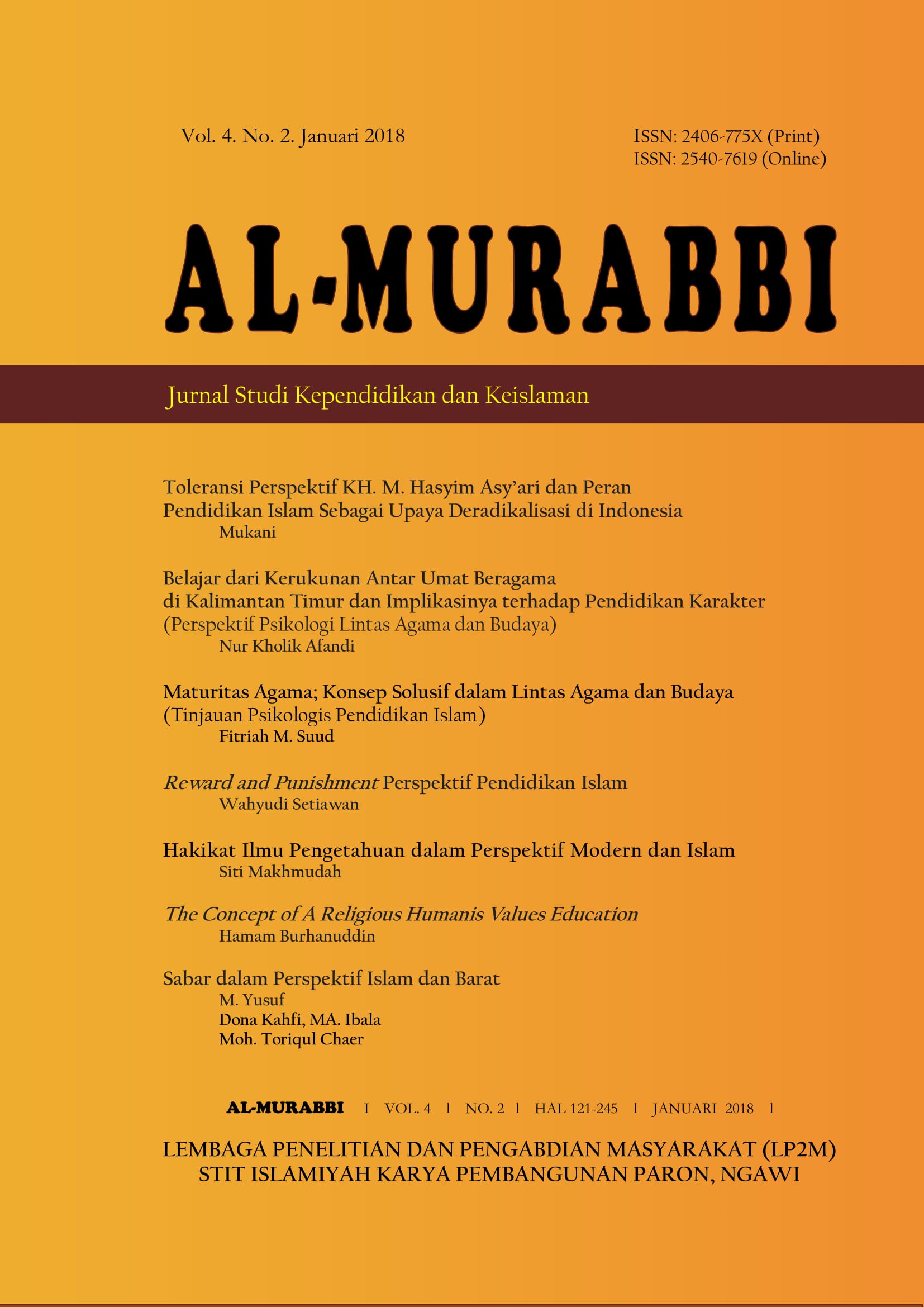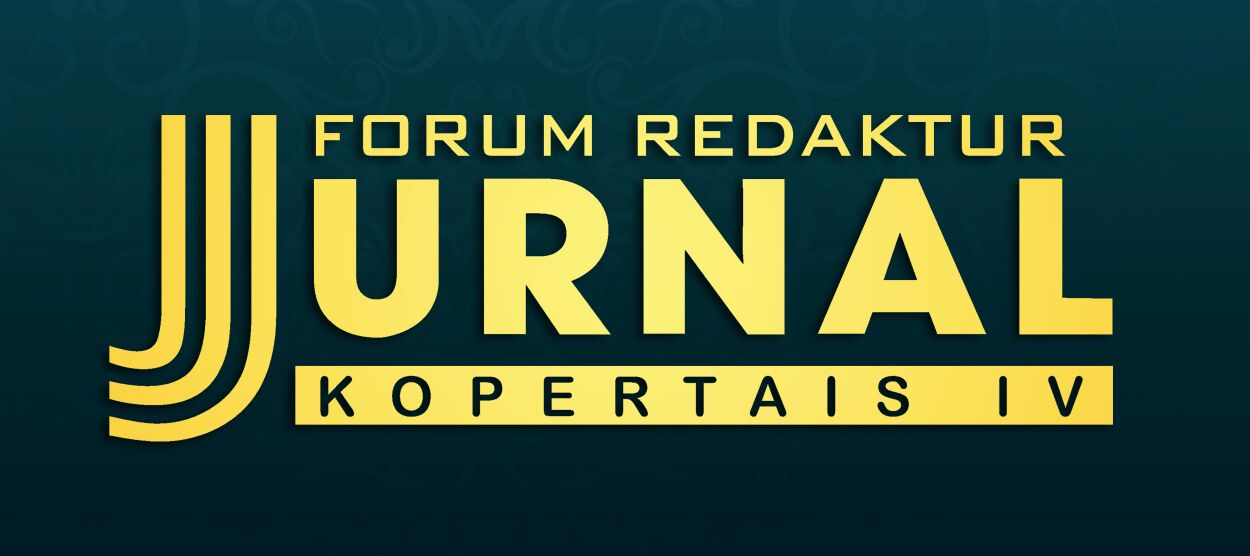Reward and Punishment dalam Perspektif Pendidikan Islam
Abstract
Realizing the nature of the purpose of education is our duty together. A variety of efforts in achieving the goal of education is carried out by all parties, ranging from models, devices, education/educators, and parents together. Reward and punishment is part of the model and strategy in education. A cornerstone in the application of reward and punishment found in the human psychic instincts will feel pleasure when accepting gifts and grieve while receiving punishment. In Islam, there are several verses of the Quran which explains about reward and punishment, and in the West, there is a psychological theory that explains the importance of reward and punishment. Reward aims to provide motivation and a new spirit for the children so that repetition of the conduct plus behaviour, while the punishment is given to give a deterrent effect to the child and deliver a message to other children so as not to do the violation of a rule.
Downloads
References
Abdurrahman Mas’ud, “Reward and Punishment dalam Pendidikan Islamâ€, Jurnal Media, Edisi 28, Th. IV, November, 1999.
Abdurrahman Shaleh Abdullah, “Landasan dan Tujuan Pendidikan menurut al-Qur’an serta Implementasinyaâ€, Bandung: Diponegoro, 1991, hlm. 236.
Abdurrahman Shaleh, “Teori-teori Pendidikan Berdasarkan al-Qur’anâ€, Jakarta: Rineka Cipta, 1994.
Abdurrazak Husain, “Hak dan Pendidikan Anak dalam Islamâ€, Jakarta: Fikahati, 1992.
Abu Ahmadi dan Nur Uhbiyati, “Ilmu Pendidikanâ€, Jakarta: Rineka Cipta, 1991.
Abu Hamid Muhammad al-Ghazali, “Ihya’ Ulumuddinâ€, juz III, Beirut: Darr al-Kutub al-Ilmiyyah, t.th.
Abu Thayyib Muhammad Syamsul Haq, “A’unul Ma’budâ€, Syarah Sunan Abu Daud, Juz II, Beirut: Daar al-Fikr, t.th.
Ahmad Ali Budaiwi, “Imbalan dan Hukuman Pengaruhnya bagi Pendidikan Anakâ€, Jakarta: Gema Insani Press, 2002.
Ahmadreza Fatahian Kelshadroky. “The Role of Reward and Punishment in Learning.†Diakses 18 Oktober 2017. https://bipublication.com/files/20160286.pdf.
Ali Imron, “Manajemen Peserta Didik Berbasis Sekolahâ€, Jakarta: Bumi Aksara, 2012, hal. 169.
Amir Daien Indrakusuma, “Pengantar Ilmu Pendidikanâ€, Surabaya: Usaha Nasional, 1973.
Asma Hasan Fahmi, “Sejarah Filsafat Pendidikan Islamâ€,Jakarta : Bulan Bintang, 1979.
Charles Schaefer, “Bagaimana Mempengaruhi Anakâ€, Jakarta: Dahara Prize, 1989.
Dafids L. Sills, “International Ensyclopedia of The Social Sciencesâ€, London: Collier Macmillan, 1972.
Elizabeth Bergner Hurlock, Op. cit.,
Emile Durkheim, Pendidikan Moral; Suatu Studi Teori dan Aplikasi Sosiologi Pendidikan, Jakarta: Erlangga, 1990.
Hamka, Tafsir al-Azhar, Juz IV, Jakarta : Pustaka Panjimas, 1987.
Langa, Claudiu. “Rewards and Punishments Role in Teacher-Student Relationship from the Mentor’s Perspective.†Acta Didactica Napocensia 7, no. 4 (2014): 7.
M. NgalimPurwanto, “Ilmu Pendidikan Teoritis dan Praktisâ€, Bandung: Remaja Rosdakarya, 2006.
M. NgalimPurwanto, “Ilmu Pendidikan Teoritis dan Praktisâ€, Bandung: Remaja Rosdakarya, 2006.
Maria J. Wantah, “Pengembangan Disiplin dan Pembentukan Moral pada Anak Usia Diniâ€, Jakarta: Departemen Pendidikan Nasional, 2005
Muhamaad Athiyah al-Abrasyi, “Tarbiyyah al-Islamiyah wa Falsafatuhaâ€, Mesir: As- Syirkham, 1975.
Muhammad Abdul Mujib, dkk., “Kamus Istilah Fiqihâ€, Jakarta: Pustaka Firdaus, 1994.
Muhammad Ali Quthb, “Auladuna Fi Dlau-it Tarbiyah al-Islamiyah: Sang Anak dalam Naungan Pendidikan Islamâ€, Kairo: Maktabah Qur’an, 1993.
Muhammad Fuad abdi al-Baqi, Op. cit.,
Muhammad Muhyidin Abdul Hamid, “Sunan Abu Daudâ€, Juz I, Indonesia: Maktabah Dahlan, t.th.
Ngalim Purwanto, MP., “Ilmu Pendidikan Teoritis dan Praktisâ€, Bandung: Remaja Rosdakarya, 1995.
Sak, Assist Prof Dr Ramazan, dan Lect Betül Kübra Şahin Çiçek. “The Persistence Of Reward And Punishment In Preschool Classrooms.†Journal of Educational & Instructional Studies in the World 6, no. 3 (2016). https://pdfs.semanticscholar.org/ab2f/4c39347db866f7407a6082b9565223febb56.pdf.
Suharsimi Arikunto, “Manajemen Pengajaran Secara Manusiawiâ€, Jakarta: Rineka Cipta, 1993.
Hamka, “Tafsir Al-Azhar Jilid 1â€, Jakarta: Gema Insani, 2015.
Copyright (c) 2018 AL-MURABBI: Jurnal Studi Kependidikan dan Keislaman

This work is licensed under a Creative Commons Attribution-ShareAlike 4.0 International License.











